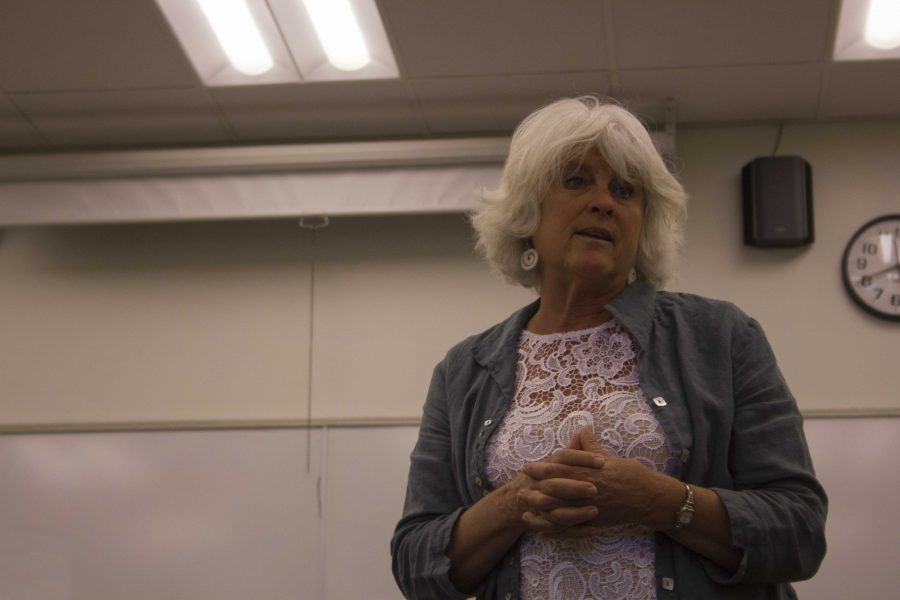Career Transfer Center is ready to help
Career Transfer Center Director Judi Gould speaks to Journalism students in room T-211 about the benefits the CTC can offer them. Photo credit: Ciara Gallagher
May 6, 2014
With the end of the school year comes a lot of anticipation and excitement. Many Moorpark students are hearing back from four year universities and getting ready to graduate and transfer.
This exciting time often comes with high doses of anxiety and life changing decisions. It can be quite a confusing time, trying to figure out which school is best in what major. Even the way schools are judged can get confusing – there are many factors that go into an education, and different ones are important to different students.
In trying to figure out every aspect of transferring, students can often feel alone and lost, but there is one resource always there to help. The Career Transfer Center offers guidance and advice to any student who is thinking about transfer, no matter how close or far one is to graduation.
Even students who are just starting at Moorpark can visit the Career Transfer Center to plan their classes and choose a major for the easiest and most efficient road to a university.
“You should be thinking about transferring the moment you get here,” Judi Gould, director of the Career Transfer Center, said.
Many classes that can be used to satisfy general education requirements can also satisfy major prep requirements and other transfer programs, says Gould. However, overlapping these classes requires a lot of planning.
“People should take advantage of the AA-T [Associate Degree for Transfer]… It intersects with the IGETC and the major prep,” Natalie Lai, 20, Communications major, said.
As part of helping newcomers plan these overlapping courses, the Career Transfer Center started a special orientation class for first year students.
This is a half credit class which meets for two days during the summer. Each day is four hours long for a total of eight hours of orientation and guidance. Gould urges every incoming freshman to take this class and start planning an exit strategy.
Gould argues that it is important for a student to know their desired major and the ways to get there as early as possible.
“If a student knows what they are going to do… they can get out of here in two years,” Gould said.
Two years is the expected time for a student to spend at Moorpark, but there are many instances in which a student will end up staying longer. Often, this happens because of undecided majors or inefficient planning, but it can also result from majors with a lot of prep classes.
Certain majors – such as engineering – require more prerequisites than usual, which often need to be taken in order. This often leads to a longer time before transfer, according to Gould.
Students can overcome this effect by meeting with counselors regularly and taking the courses that will overlap in multiple areas.
“I had an amazing counselor… that really helped,” Divya Khullar, 20, Business Administration major, said. “[It] helped me plan my classes sequentially.”
Once a student makes all of the plans and takes all the classes, there is still a huge question of what happens next. Universities can be prestegious because of their name, their location or their programs, among many other criteria. It can get very confusing to determine the right school.
“There are so many good schools,” Gould says.
Gould argues that the most important aspect of a campus is atmosphere, and she urges prospective students to go to preview days as well as visit the campus while in session, to make sure that it fits properly.
“I think the student should be comfortable on that campus,” Gould said.
Funding is also a big issue when it comes to choosing a university, as it can quickly get very expensive. Gould believes that every student should apply for financial aid, even dependents of middle or high economic class families “because you never know.”
There are also non need based alternatives to financial aid, which can provide a student with school funding based on major or merit. These are all found through the Moorpark Scholarship Office.
“Every student that’s transferring should be registered with our scholarship office,” Gould said.
A lot of planning and anticipation goes into transferring from Moorpark, but it is the goal most students are trying to achieve. There are many resources, such as the Career Transfer Center, willing and able to help students at any time, whether they are just starting off or getting ready to leave






